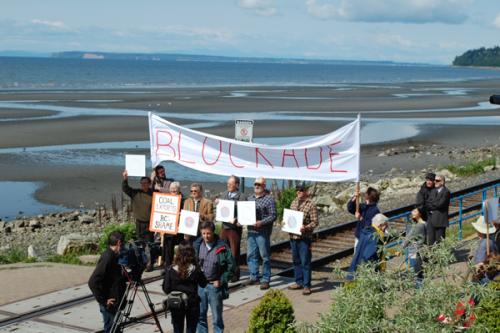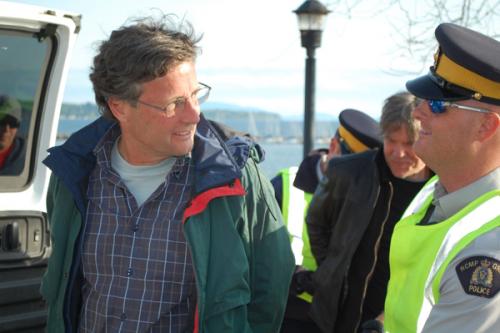Fourteen Arrested Blocking BNSF Coal Train In White Rock
By Carrie Saxifrage
07 May, 2012
Vancouver Observer

Fourteen Canadians were arrested for civil disobedience at 6 p.m. after sitting down on the tracks in front of an oncoming coal train in White Rock. Their vigil began at midnight, but Burlington Northern Santa Fe (BNSF) cancelled many of its scheduled runs in anticipation of the protest.
Climate activists arrested at behest of Warren Buffett's BNSF railway over coal blockade
Coal is a likely target for climate stability advocates because it has the highest greenhouse gas emissions per unit of energy of all fossil fuels and because there is enough economically available coal to trigger run away climate change. Over eight million tons of coal from Powder River Basin, Montana traveled through the lower BC mainland in 2011. BNSF transports the coal through White Rock to the Westshore terminals. BNSF is owned by Warren Buffett’s Berkshire Hathaway Inc.
Will Horter, one of those arrested, stated, “We brought attention to the massive size and increase in the transport of coal through BC and took an action that we hope will ill inspire citizens to assert control in a dangerous situation in which the political leaders are failing to protect our children’s future.”
The climate stability advocates were charged under the Railway Act and fined $115. They have a right to a hearing to contest the charges.
Mark Jaccard, Nobel Peace Prize Laureate, among those arrested
Nobel Prize Laureate and SFU professor Dr. Mark Jaccard was among those arrested. “I’m a naïve product of working class Burnaby,” he said. “I’ve never broken a law in my life. I’m very uncomfortable taking this position.”

Dr. Mark Jaccard, being handcuffed, follows a precedent set by Dr. James Hansen, another Nobel Laureate arrested for civil disobedience related to climate change.
“If governments were acting to reduce GHG emissions, or slow the rate of increase, I wouldn’t be here today,” he continued. “I’d be helping those governments to do that. But in the last few years, especially in Canada under Harper, the emphasis has been on accelerating the rate at which we are destroying the planet. So I have to ask myself and I have to ask everyone else, ethically, what is the right thing to do? It’s made me read more about civil disobedience, people like Mahandas Gandhi, Martin Luther King and Henry David Thoreau.”
Rather than appreciation for his civil disobedience, Jaccard encourages participation. “I really think that we should all be doing this,” he said. “I’m here drawing attention to myself for ethical reasons, but I don’t want to be a martyr. I’d much rather that there were 10,000 of us out here. Everyone has the ability to know how dangerous the current situation is.”
Jaccard’s career as an environmental economist focuses on developing policies to move toward a sustainable economy. He’s participated in numerous governmental and intergovernmental assessments, including work for the International Panel on Climate Change. He has advised the US, collections of European governments, the State of California, and provincial governments including BC, Ontario and Quebec.
“We are heading for a real crisis in which we’ll have to start ripping infrastructure apart,” he stated in response to a question by another protester. “We can avoid that. Over 100 coal plants in the US were cancelled or put on hold because of people like us. It created a big increase in renewable energy and it is happening rapidly. Those places are avoiding a crisis.”
BC: Carbon gateway of North America
According to one source, Warren Buffett considered BNSF a promising investment because he foresaw the growing need to transport coal out of the US, where it is losing its market due to its notoriety as a potent instrument of climate change. According to one activist, the transport of coal from the US to the Westshore Terminals has increased by 60% in the last two years.
Author and founder of 350.org Bill McKibben finds Buffett’s association with coal puzzling: Buffettt is known for his support for tax equity and his planned legacy to the Bill and Melinda Gates Foundation. Yet he enables massive coal emissions with climate impacts which will hit hardest on the world’s most vulnerable people. Scholars such as Jaccard and McKibben believe that BC must take responsibility, not only for the emissions resulting from the extraction and transportation of fossil fuels, but also for the emissions from their use at a final destination.
While the US has either stopped or put on hold 100 coal plants, Jim Pattison’s Westshore Terminals are still an eager recipient for BNSF’s coal delivery. Its website boasts:
Coal from the United States Powder River Basin is being exported through Westshore at record levels, exceeding 8 million tonnes in 2011. Westshore's future has never been brighter, with the most bullish coal market in the past 30 years. With this in mind, Westshore has signed long-term contracts with its major customers [including the United States Powder River Basin] to ensure security of supply well into the future.
The coal from Powder River Basin contributes to BC’s dubious distinction of being North America’s largest export gateway for fossil fuels. Westshore Terminals alone shipped 27.3 million tons of coal in 2011. That’s about 55 million tons of carbon dioxide, the amount of carbon dioxide that BC gives off in burning all its fossil fuels combined.
According to Kevin Washbrook of stopcoal.ca, the coal transport through BC benefits the 1% at the expense of everyone else: profit for Buffett, the third wealthiest man in the world, and Jimmy Pattison, the 5th wealthiest man in Canada. It creates no jobs for BC residents and creates conditions that hit vulnerable people the hardest. Washbrook was among those arrested for blocking the coal train.
Statements by persons arrested for civil disobedience:
“These actions are necessary because they are commensurate with what is really going on. A lot of people are doing stuff but it falls short of what we need. We have to say that fossil fuel pollution is destroying the earth and it has to stop. It’s plain and simple. No more discussions, no more half measures. It’s time to say “let’s stop it” and to figure out the best way to do that. The science is so clear. David Suzuki said 10-15 years ago that we have 10 to 15 years left to act. It’s clear as can be that these trains are taking coal to places where it will be burned and put into the air and it has to be stopped.”
“We are on the wrong course as far as climate goes and rational appeals aren’t being listened to so this is the last avenue. To not do something would just be ignorant or ignoring the facts. Terrible things are ahead if we don’t take action now. That’s why I’m here. There’s so much information out there. I wouldn’t be able to face my grandchildren or children if I didn’t do anything with what I know now. I think other people will be catalyzed into action when they realize that there are lots of us involved and they won’t be a lone person on an island. With other people to support them and armed with the facts, people will increasingly take part. The truth is out there. The science has been telling us for decades that we are responsible for it and capable of changing it.”
“I’m a big believer in taxation on energy and then taking that revenue to do what we need to do in our society. And I’m a big believer in the jobs that that will create for young adults in Canada. All we have to do is raise taxes on energy.”
“I graduated from university a year ago in environment and policy science. I now have important has knowledge and that creates an obligation to pass it on to other people, to be someone that others can come to . I feel emotional today because I know a lot of passionate young people who are ready to act and today I see older people willing to act as well. Some big change is going to happen soon and I’m excited about that.”
“I care about the planet. I grew up as a hiker and I care about the environment. The fact that I have children has nothing to do with it. All the planet’s children are my children.”
"Everything I read about climate change says that we have only a few years left to turn it around or it's going to be out of our control. We are putting so much pollution in the atmosphere, even if we stop burning fossil fuels right now, the earth is still getting warmer.”
The day in White Rock
Activists arrived at midnight, hoping to catch the first of the three coal trains scheduled for the pre-dawn hours. Police arrived on the scene in force at about 8 am. RCMP Police Chief Roseberry, also on the scene in White Rock, stated that her concern was for public safety, and preventing human injury as a result of protesters on the train tracks.
All morning, the citizens of White Rock strolled and jogged past the bristling strategy scrums of both police and climate stability advocates, expressing frustration with the inconvenience of a controversy that landed squarely on their lovely sea wall on a sunny day.
At about 10:30 a.m., activists and police gathered for a discussion of the terms of the injunction that BNSF had obtained the day before. The RCMP acknowledged that interpretation of the injunction would be subject to the on-the-ground discretion of its officers, and that officers could charge blockaders either pursuant to the injunction or to the criminal code.
According to one of those arrested, the police exercised their discretion in arresting the protesters under the Railway Act rather than under the injunction.
Activists tend to prefer arrest under the criminal code because it allows them the opportunity to offer the court a statement regarding the purpose of their civil disobedience and allows them to assert defenses under the Charter of Rights. For the same reasons, civil injunctions are favored as the enforcement mechanism of choice by corporate property owners.
At around noon, the police officers dispersed, to regroup later in the afternoon. Protesters asked BNSF to provide the time of the next coal train so that they could resolve the safety issues up front, but BNSF refused to provide that information. Negotiations between the parties resulted in a tentative agreement that the protesters would disperse at dusk with no arrests. However, BNSF chose to go forward with moving the coal train into the area before dusk and having the protesters arrested.
Onward, the train
Following the arrests, the tracks were cleared for a train with 125 cars carrying 13,000 tons of coal that will eventually emit 26,000 tons of CO2. That much CO2 would bring $650,000 to the province in revenues if coal for export was subject to the BC carbon tax.
Gus Melonas, Corporate Relations for BNSF
By telephone, Melonas made no comment regarding the protester’s rationale for action.
©Observer Media Group
Due to a recent spate of abusive, racist and xenophobic comments we are forced to revise our comment policy and has put all comments on moderation que.


